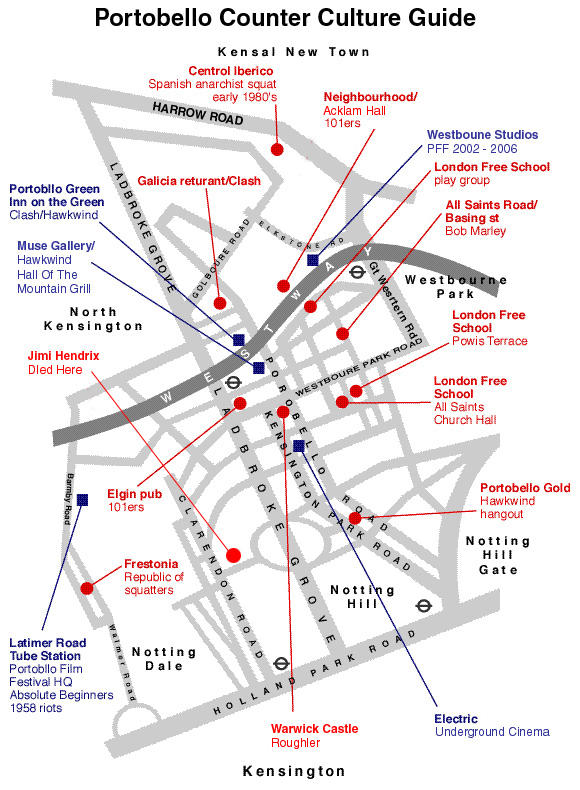PORTOBELLO FILM FESTIVAL 2006
Counter Culture Portobello
Psychogeographical History
by Tom Vague.
Back to main
page
Part 1 - ABSOLUTE
BEGINNERS
Part 2 - THE LONDON FREE SCHOOL
Part 3 - HAWKWIND
Part 4 - BOB MARLEY AND THE WAILERS
Part 5 - STRUMMERVILLE
Part 6 - FRESTONIA
7 SKETCHES OF
SPAIN
‘The first prime minister’, the Whig Robert Walpole, was
finally ousted from power in the 1740s by an unillustrious, Tory encouraged
war with Spain over trading rights. By the 1720 Treaty of Utrecht Assiento
Britain supplied 5,000 African slaves a year to South America. To curtail
any further British trade guard-ships patrolled the Spanish Main. The
conflict was sparked by an incident in which a British captain, suspected
of smuggling, reputedly had his ear torn off by the commander of a Spanish
boarding party. The highlight of ‘the War of Jenkins’ Ear’
was the 1739 battle of Porto Belo, on the isthmus of Darien (now Panama),
in which the Spanish stronghold was taken by a small fleet under the
command of Admiral Edward Vernon.
When news of the victory reached Britain the following year it caused
much jubilation, largely because it meant the end of Walpole’s
Whigs. Bonfires were lit, medallions struck, and places named in honour
of the event. Thus, it seems, that the North Kensington farmer Adams
(probably Abraham) came up with the name for his new farmhouse. The
Edinburgh Portobello is said to have acquired its name from members
of Vernon’s crew who bought the land with their bounty.

In other, less savoury, consequences of the battle of Porto Belo, a
follow up raid on the stronger Spanish port of Carthagena failed disastrously,
while recruitment for the war effort in New York caused an uprising
of Africans, Irish and Spanish prisoners known as ‘the Slave plot’
of 1741. So, it was with some historical irony that in the late 20th
century farmer Adams’ land was occupied by Afro-Caribbean, Irish
and Spanish communities. The site of his farmyard is now the Colegio
Espanol Canada Blanch Spanish School.
In 1928 George Orwell set out from 22 Portobello Road on his way to
pay Homage to Catalonia in the Spanish Civil War. In the late 30s, after
the German blitzkrieg of Guernica in the Basque region, refugees from
the civil war began settling in North Kensington, close to the Spanish
Republican government in exile in Bayswater, some brought over by the
Spanish priest at St Mary’s who was from Bilbao. In the 50s, 60s
and 70s their numbers were swelled by more exiles from Franco, and economic
migrants from Andalucia and Galicia. The stretch of Portobello Road
from Lancaster Road to Golborne Road, between Garcias deli at 248 and
the Galicia restaurant at 323, duly came under Spanish control. In the
case of the former convent Spanish School literally, when King Juan
Carlos bought the old Portobello farm land.
‘Spanish songs in Andalucia, the shooting sites in the days of
’39, oh, please leave the vendanna open, Fredrico Lorca is dead
and gone, bullet holes in the cemetery walls, the black cars of the
Guardia Civil, Spanish bombs on the Costa Rica, I’m flying in
on a DC10 tonight, Spanish bombs, yot’ quirro y finito, yote querda,
oh ma corazon… Spanish weeks in my disco casino, the freedom fighters
died up on the hill, they sang the Red Flag, they wore the black one,
but after they died it was Mockingbird Hill… Spanish bombs shatter
the hotels, my senorita’s rose was nipped in the bud, the hillsides
ring with ‘Free the people’, or can I hear the echo from
the days of ’39? With trenches full of poets, the ragged army,
fixing bayonets to fight the other line, Spanish bombs rock the province,
I’m hearing music from another time, Spanish bombs on the Costa
Brava, I’m flying in on a DC10 tonight, Spanish songs in Andalucia,
Mandolina, oh ma corazon, Spanish songs in Granada – oh ma corazon.’
The ‘London Calling’ Clash track ‘Spanish Bombs’
is Joe Strummer’s homage to the International Brigades of the
Spanish Civil War (who included George Orwell) and the fight against
fascism in the 30s, juxtaposed with the Basque ETA group’s bombing
campaign against the Spanish tourist trade in the 70s. It’s also
a love song, dedicated to Joe’s Spanish girlfriend Paloma ‘Palmolive’
Romano, from his local squatting days, who went on to be the drummer
of the Slits and the Raincoats. In other Hispanic punk links, Joe’s
pub rock group the 101ers started out as El Huaso and the 101 All Stars,
and their album was released on the Andalucia label. His post-Clash
groups were the Latino Rockabilly War and the Mescaleros, he starred
in the punk western ‘Straight To Hell’, which was shot in
Spain, and the Spanish restaurant Galicia at 323 Portobello Road figures
highly in the Clash bar guide.
Centro Iberico, at 421 Harrow Road alongside the canal, was a former
school squatted by Spanish anarchists in the early 80s. As the Anarchy
or Alternative Centre it provided suitably Crass-ite anarcho-punk conditions
for gigs by the Mob, Conflict, Poison Girls and the Subhumans, as well
as an industrial setting by the gas works for Throbbing Gristle, and
a gothic vibe from Kensal Green cemetery for Blood & Roses. Until
recently graffiti of the First of May anti-Franco anarchist group (who
were closely linked to the Angry Brigade) could be seen on the wall
opposite the Spanish school on Portobello Road.
Following the liberation of Aragon in 1936 the Spanish Anarchist hero
(and punk rock influence) Buenaventura Durruti told Pierre Van Passen
of the Toronto Daily Star: “We are setting an example to the German
and Italian working class how to deal with fascism.” Van Passen:
“Do you expect any help from France and Britain now that Hitler
and Mussolini have begun to assist the rebels?” Durruti: “I
do not expect any help for a libertarian revolution from any government
in the world.” Van Passen: “Can you win alone? You will
be sitting on top of a pile of ruins even if you are victorious.”
Durruti: “We have always lived in slums and holes in the wall.
We will know how to accommodate ourselves for a time. For, you must
not forget, that we can also build these palaces and cities, here in
Spain and in America and everywhere. We, the workers. We can build others
to take their place. And better ones. We are not in the least afraid
of the ruins. We are going to inherit the earth. There is not the slightest
doubt about that. The bourgeoisie might blast and ruin its own world
before it leaves the stage of history. We carry a new world here, in
our hearts, that world is growing in this minute.” Van Passen
signed off with: ‘From the distance came the roll of the cannonade.’
The Spanish Memories Group meets every Friday afternoon at 240 Lancaster
Road, where all are welcome to come and share memories of Spain.



